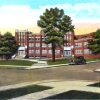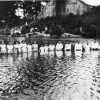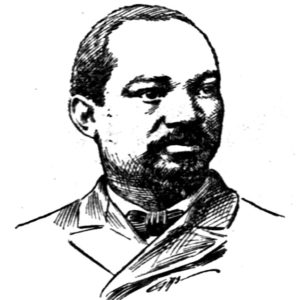calsfoundation@cals.org
Lewis Johnston Jr. (1847–1903)
Lewis Johnston Jr. was the first African American ordained as a minister in the Reformed Presbyterian Church and the founder (with his wife) of the Richard Allen Institute in Pine Bluff (Jefferson County), a school black students. He was also a teacher, writer, and newspaper publisher. He worked with Professor Joseph Carter Corbin and the Reverend Elias Camp Morris during a time of major transformation in the development of education for African Americans. Four of his sons were killed during the Elaine Massacre in 1919.
Lewis Johnston Jr. was born free on December 12, 1847, in Blairsville, Pennsylvania, to Lewis Johnston (1805–1881) and Jane Bronson Johnston (1810–1897). His father had been born a slave in Derry, Pennsylvania, and later became the first black Covenanter elder east of the Allegheny Mountains. His mother had twelve children, but only he and another sibling survived her: his sister Mary E. Massey, who was for a time the wealthiest black woman in western Pennsylvania.
In 1860, Johnston was living with his parents and sister Nancy in Blairsville, Pennsylvania. During the Civil War, he served as a corporal in the United States Colored Infantry, Forty-First Regiment, Company B.
On March 2, 1870, Johnson married E. Mercy Ann Taborn, daughter of Harrison Taborn and Isabella Jones Taborn, in Marysville, Ohio; she had been born free on March 4, 1848, in Granville, North Carolina. The Johnsons had seven children: Jennie B. Johnston Childress (1872–1974), William M. Johnston (1876–1923), Louis Harrison (L. H.) Johnston (1879–1919), David Augustine Elihue (D. A. E.) Johnston (1881–1919), Mercy F. Johnston (1883–1951), Gibson Allen Johnston (1890–1919), and Leroy Alfred Johnston (1894–1919).
In 1870, Johnson and his wife were both attending school in Richland Township, Ohio. He later attended the theological seminary in Allegheny City, Pennsylvania. In 1874, he was ordained a minister of the Reformed Presbyterian Church. On June 11, 1874, he founded the Geneva Academy, later renamed the Knox Academy, in Selma, Alabama. On November 14, 1876, he was suspended from his ministerial duties and church privileges in Selma for unknown reasons.
He later moved to Little Rock (Pulaski County), where he was a school teacher. In 1880, the Johnson family was living in Vaugine Township, Jefferson County. In 1882, Johnson was a court clerk and also worked in a newspaper office. On May 24, 1883, he was restored to his ministerial duties by the Pine Bluff Presbytery of the Presbyterian Church. He began publishing the Pine Bluff Reformer and in August 1883 was working as a professor at the Eleventh Judicial District Teachers’ Normal Institute in Pine Bluff. In 1886, he and his wife founded the Richard Allen Institute. Johnston was also a member of the Colored Teachers Association of Arkansas.
After a serious illness, Johnston wrote his last will and testament on May 2, 1890, almost thirteen years before he actually died.
Johnston became editor of the Enterprise in February 1895. It was published by the Richard Allen Institute. In 1896, he published a 140-page book of sixty poems, Words of Consolation. The book was printed in Little Rock at Philander Smith College’s printing department. By December 1899, Johnston was superintendent of the black delegation of the Arkansas Anti-Saloon League. In 1900, he and his wife were living in Pine Bluff with five of their children.
In 1900, Johnston published his book Advice to Boys: With Information They Ought to and Must Know. Their Make-Up, Dangers, Traps that Catch Men. Chapter I of the book contained poetry and fables. Chapter II contained fables; discussed avoiding vices such as gambling, drinking whiskey, and using tobacco products; and defined boys’ make-up—that is, physical organs. Chapter III focused on avoiding adultery, masturbation, and so-called unnatural sexual acts. It also listed cures for gonorrhea, syphilis, and lice and crabs. Chapter IV defined marriage, divorce, fornication, adultery, incest, and seduction. Chapter V was about reaping what you sow, such as getting a sexually transmitted disease from not heeding the book’s advice; practicing self-control; and shunning bad company. There was also a glossary of terms.
Johnston died on March 7, 1903, in Pine Bluff. His obituary was published in newspapers across the United States.
Four of Johnston’s sons—David Augustine Elihue (D. A. E.) Johnston, Louis Harrison (L. H.) Johnston, Gibson Allen Johnston, and Leroy Johnston—were killed under mysterious circumstances on October 2 by posse members during the time of the Elaine Massacre of 1919.
In 2018, Leroy Johnston, a World War I veteran who had served overseas with the Harlem Hellfighters and had recently returned at the time of his death, was posthumously honored with the Purple Heart and other World War I honors that he was denied a century before due to altered medical records.
For additional information:
“The Colored People of Pine Bluff Have Another paper, the Enterprise.” Pine Bluff Daily Graphic, February 17, 1895, p. 2.
“Deaths: Lewis Johnston [Sr.].” Indiana Democrat, April 28, 1881, p. 3.
“Elaine Massacre Victim to Posthumously Receive Medals for Service in World War I.” UA Little Rock University News. https://ualr.edu/news/2018/09/13/leroy-johnston-medals/ (accessed July 16, 2019).
“The Eleventh Judicial District Teachers’ Institute.” Arkansas Weekly Mansion, August 18, 1883, p. 4.
“The Late Rev. Lewis Johnston.” The Christian Nation, June 3, 1903, p. 4.
“Lived at Pine Bluff—Bodies of Four Johnston Brothers Taken There for Burial.” Arkansas Gazette, October 4, 1919, p. 3.
“Recent Death: Rev. Lewis Johnston.” Indiana County Gazette, March 18, 1903, p. 1.
Gwendolyn L. Shelton
Pine Bluff, Arkansas
 Education, Elementary and Secondary
Education, Elementary and Secondary Post-Reconstruction through the Gilded Age, 1875 through 1900
Post-Reconstruction through the Gilded Age, 1875 through 1900 Religion
Religion Lewis Johnston Jr.
Lewis Johnston Jr. 




Comments
No comments on this entry yet.